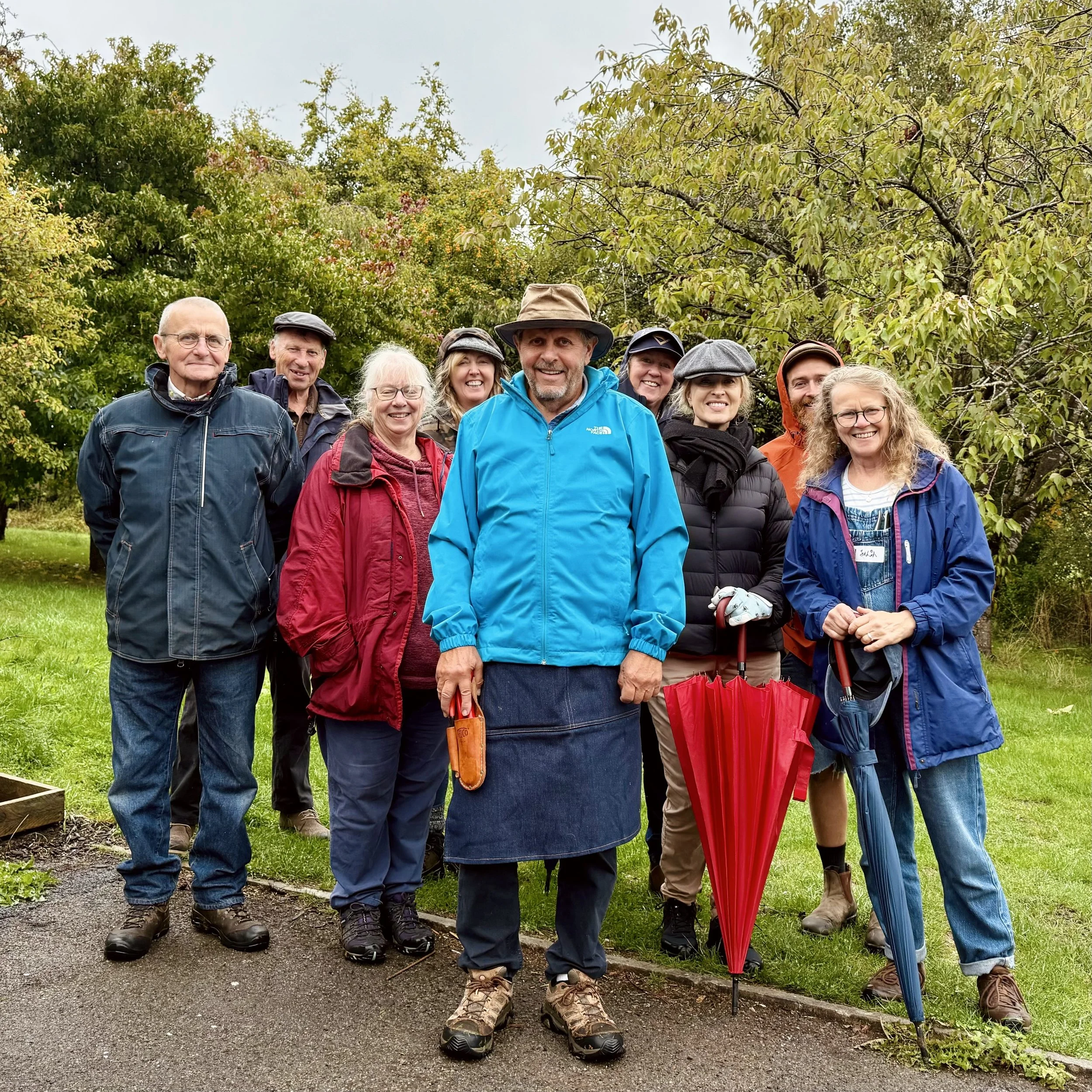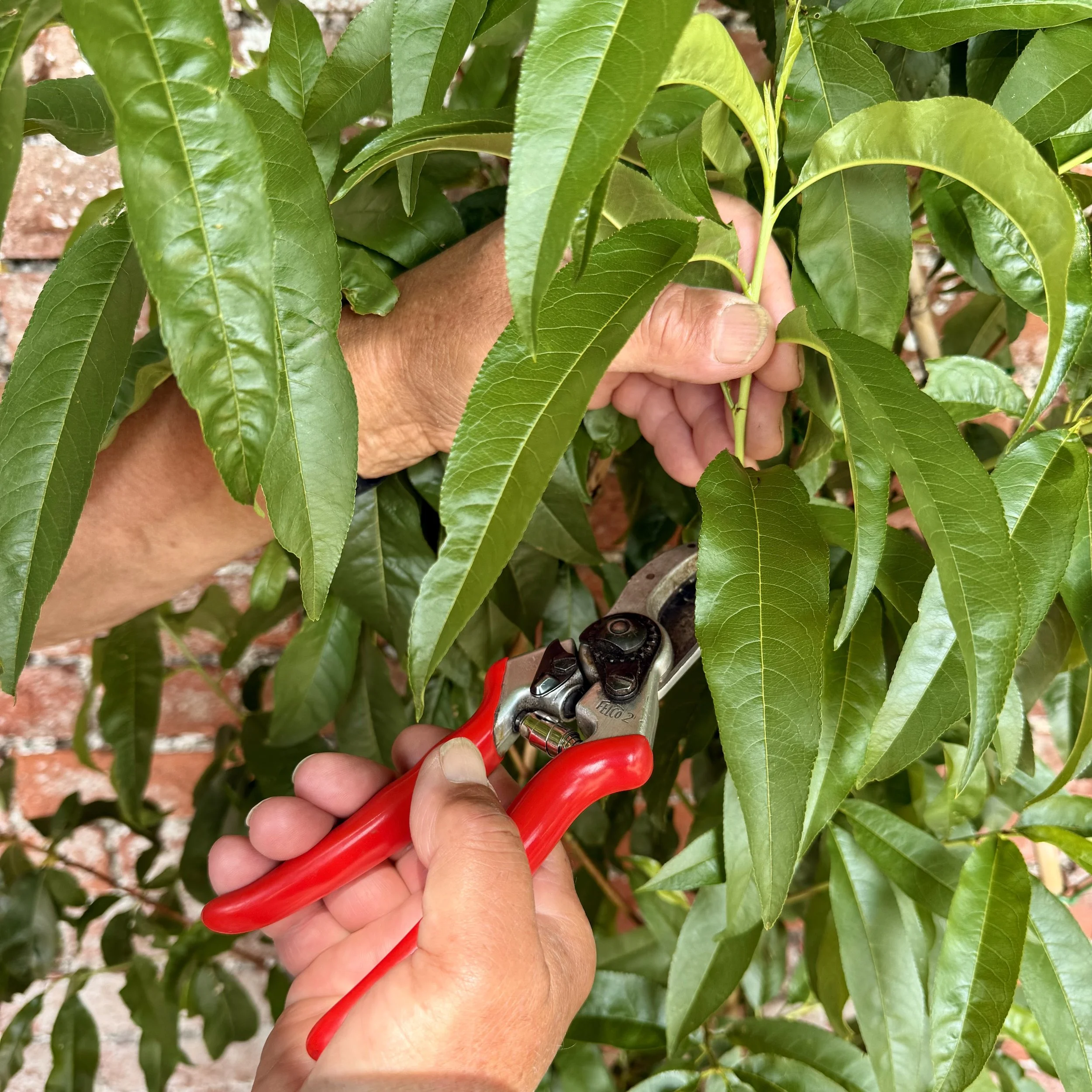In conversation with Chris Smith, Pennard Plants
It’s hard to think of heritage horticulture in Somerset without thinking of Chris Smith of Pennard Plants. A man with an encyclopaedic knowledge of varieties and a knack for coaxing the most reluctant fruits and vegetables into abundance, Chris is as much a custodian of tradition as he is an innovator in the garden.
Chris (centre) with Asterion & Co. guests - all smiling despite the rain showers
I first met Chris more than five years ago and, with his guidance, stocked my own garden. He’s a kind man with a generous spirit, and when I told him about my plans for a heritage-inspired learning centre he committed straight away — officially becoming my very first ‘& Co’. I will forever be grateful of his faith in me and the vision for Asterion & Co.
We convened again at the nursery in East Pennard, where I’ve been learning the art of pruning and finalising plans for our forthcoming Asterion-hosted fruit tree pruning courses. Over mugs of tea, escaping the August sun in the shade of abundant plum trees, we spoke about what makes plants — and people — thrive. Our conversation wove through stubborn crops, unexpected joys, and the values that underpin both good growing and good living.
Roots and Beginnings
Chris’s love of horticulture runs deep: “My father and grandfather were great vegetable growers. I’d be given ‘children’s seed packs’ at Christmas and a little plot to sow them in. Harvesting that first radish was always a thrill. That love of growing has never left me in my career path, that included training to be a school teacher, until I eventually made it my full time focus.”
From those first radishes to running a nationally respected nursery has been quite a journey:
“My business partner Mike and I both worked in garden centres but wanted to be more involved with plants than cafés. When the walled garden at East Pennard came up to rent, we took it — and that was 25 years ago. We started with grasses and perennials, then moved into edibles around 2006 when almost no one else was doing it. The seed range has grown to about 500 varieties now, mostly heritage, with flavour always the most important factor.”
Craftsmanship in Cultivation
Getting things ‘just right’ takes persistence and care: “We’ve worked hard to grow peat-free, pesticide-free, relying on natural pest control. It took a long time to get the compost right.”
Some plants test a grower’s patience more than others: “After nine years of trying, I still remember the joy of seeing my first Persimmon (Sharon fruit) finally ripen.”
When asked which plant says ‘Pennard’ the most, Chris said: “If I had to pick a signature plant, it would be Ugni molinae, the Chilean Guava — always a favourite.”
And the details matter: “Pruning and watering are the two things people usually get wrong — and the things I obsess over, and love to teach.”
Camaraderie and Community
Horticulture is never a solo pursuit, and sharing knowledge gives better results: “At shows in the past you met so many great growers. Even the famous ones in those days were accessible. You just struck up conversation and they were thrilled to help. These inspiring and friendly characters have disappeared. Harry Wheatcroft, Percy Thrower, Geoff Hamilton — they were all fantastic gardeners and personalities. I always had a soft spot for Percy — he opened the first garden centre I managed, and he was a true gardener.”
Chris reflects: “The most valuable lesson I’ve learnt from my horticultural peers? Don’t be impatient. Plants don’t always do what you want them to do!”
Regeneration and Responsibility
Pennard’s work is as much about stewardship as it is about sales: “We grow lots of varieties that benefit wildlife — supporting insects and birds, fixing nitrogen, enriching the soil. Heritage varieties help biodiversity and reduce reliance on monoculture, which is vital.”
Sometimes, Chris has even revived the nearly forgotten: “We found seed for an old Brussels sprout, Peer Gynt, after an appeal on TV. We also grow Skirret, a root vegetable from history that almost no one else offers.”
Accomplishment and Pride
There have been many milestones: “Winning our first RHS Gold Medal at Gardeners’ World in 2011 was a proud moment. Or sitting down with our now Queen, Camilla, at Hampton Court, the year before that win — I wasn’t expecting it and was dressed in a T-shirt and shorts! It didn’t faze her one bit and she loved talking about plants.”
Success at Pennard isn’t just measured in medals: “A good year is when we’ve grown quality plants, sold them well, and people come back because they’ve enjoyed growing them — the loyalty and trust of those customers means everything.”
Integrity in Practice
Values guide every decision: “Plants must be edible in some form, and we’re always learning about others from around the world. Our team works flexible hours and each has their own strengths. We try to give everyone a varied day’s work.”
And sometimes that means saying no: “We were once asked to grow a plant in bulk for a large seed company, but they didn’t care about teaching customers the pitfalls of growing it, which didn’t feel fair. So we declined — even if it cost us sales. We’ve often lost sales over the years by being honest.”
Challenges and Changes
The toughest part of the business: “Coping with weather — too much rain, or not enough. Some plants hate sitting wet, as we saw last winter.”
The biggest change in the horticultural business: “It’s harder to make a living in horticulture. Costs keep rising and the weather is less predictable, while the mass market — supermarkets and big chains — focus on selling plants cheap and quick. As specialist growers, we try to offer the opposite, with varieties and quality you can’t find in the big stores. It doesn’t make us immune to those pressures, but it’s a different model — one we’ve invested nearly two decades of passion into.”
One thing about public knowledge Chris would love to see change: “I wish more people understood the basic needs of plants — nutrients, water and air. That’s why I’ve always put time into creating workshops and courses. It’s a real joy when customers come back and share what they’ve accomplished after learning a bit more.”
The Road Ahead
Looking forward, Chris still has ambitions: “I’d also like to see edible perennial plants get more publicity — there’s so much value in what’s already growing in our gardens, that people just don’t know it delicious to eat. And at a personal level, as a loyal admirer of the Royal Family, I’d like to meet King Charles. His environmental ideas are very much in line with mine and I’d love to pick up some tips from him, which I just know he’ll have up his sleeve.”
And his question for my next collaborator interview?: “Do you think you will ever retire?”
When asked why this question, Chris smiles: “For most entrepreneurs, our business is our passion, it’s our hobby. I wouldn’t know what to do if I stopped growing plants. As long as I’m fit and enjoying it, I’ll continue.”
Closing
As the afternoon heat continues to build, Chris heads back into the verdant rows, working alongside his team to nurture the plants that make Pennard so well respected. Talking to him is a reminder that horticulture is not just about plants; it’s about patience, relationships, and a commitment to leaving things better than you found them.
In the months ahead, we’ll be speaking to more of Asterion’s collaborators — from artists to cooks to craftspeople — to discover what drives their work. And, as Chris suggested, we’ll carry forward his question for the next guest: Do you think you will ever retire?
To join one of Chris’s courses with Asterion, click here. You can also explore Pennard’s extraordinary range of seeds and plants by visiting them online.
Chris at work pruning a peach tree

